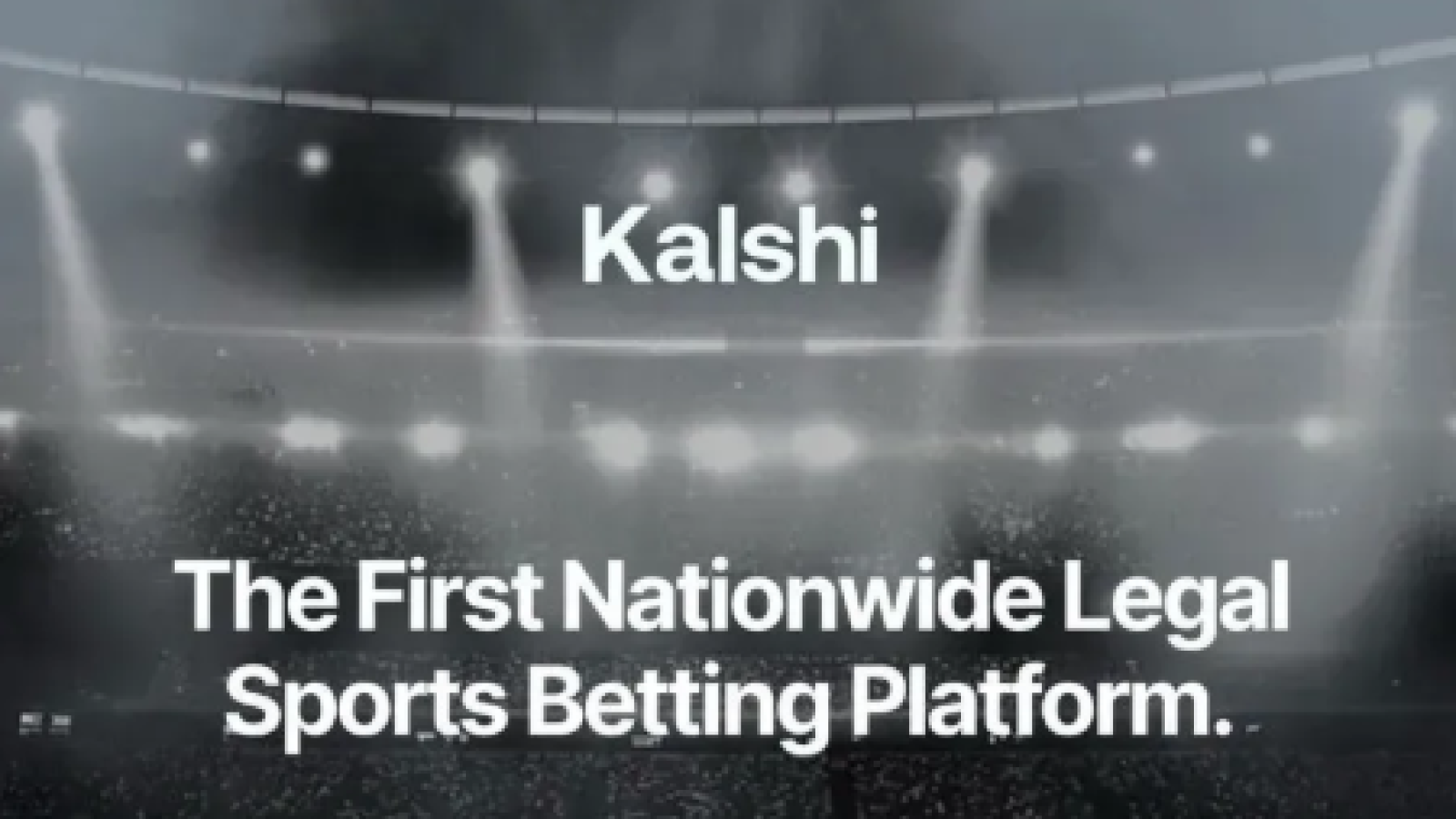Kalshi revived an old-school argument that was popular with offshore gaming sites in the 1990s and early 2000s, as the prediction market argued that accepting bets from a specific jurisdiction doesn’t mean it does business there, and cited a carve-out within the Unlawful Internet Gambling Enforcement Act (UIGEA).
However, it’s not clear that the UIGEA exception it cites is actually relevant when it comes to determining where Kalshi does business.
The prediction market filed a response motion Thursday in the U.S. District Court for the District of California, after three of the state’s tribes — The Blue Lake Rancheria, Chicken Ranch Rancheria of Me-Wuk Indians, and Picayune Rancheria of the Chukchansi Indians — sued the prediction market, as well as its partner Robinhood, in July. The tribes accuse Kalshi of unlawfully offering sports betting on their lands in violation of the Indian Gaming Regulatory Act (IGRA).
The tribes are also seeking an injunction that would block Kalshi from offering its sports event contracts on tribal lands. The response addresses the plea for an injunction, arguing that one should not be granted because the tribes are unlikely to win the case on the merits, and that the injunction would cause more harm to Kalshi than the status quo causes to the tribes.
Kalshi-blue-lake-response-1-26_compressedKalshi notes UIGEA carve-out
Key to Kalshi’s argument is the idea that IGRA does not apply because the company is based not on tribal lands but in New York.
In most respects, that type of argument — that gambling services are subject to the jurisdiction of the company taking the bet, not the location of the person placing it — had been made irrelevant by the passage of UIGEA almost 20 years ago. That law bans companies from “knowingly accepting payments in connection with the participation of another person in a bet or wager that involves the use of the Internet and that is unlawful under any federal or state law,” including IGRA.
The law was passed — as a late addition to a law that otherwise regulated port security — in order to address offshore gambling sites that offered their services to Americans while being based outside of the country.
However, Kalshi pointed to a carve-out within UIGEA clarifying that the definition of a “bet or wager” under the law “does not include … any transaction conducted on or subject to the rules of a registered entity or exempt board of trade under the Commodity Exchange Act” (CEA). Kalshi is registered as a designated contract market under the CEA.
Because of that exception, Kalshi argues that it is allowed to accept payments for a sports event contract on tribal lands, as UIGEA is the law that would make that illegal and it does not apply to registered exchanges.
“Kalshi does not maintain an office on Indian lands,” the prediction market’s response says. “Kalshi does not house servers on Indian lands. Kalshi does not employ personnel on Indian lands. Kalshi conducts no business whatsoever on Indian lands.”
The prediction market argues that IGRA, UIGEA, and the CEA can all coexist.
“IGRA regulates the conduct of gaming activity ‘on Indian lands’ — that is, gaming operations physically conducted on a tribal reservation,” the response says. “UIGEA regulates gaming activity that can be accessed via the internet in a state or reservation where it is unlawful, unless such activity constitutes derivatives trading subject to the CEA. And the CEA regulates such derivatives trading, subjecting it to a uniform regulatory framework under the ‘exclusive’ oversight of a single federal regulator, rather than the patchwork advocated by Plaintiffs.”
Does the carve-out actually matter?
However, UIGEA did not itself directly ban any type of wager. Instead, it banned the act of processing payments for wagers that were accessible in the U.S. in violation of federal or state law, and did not occur on CEA-registered exchanges.
The law was largely seen as a way of enforcing laws that already existed, by providing the option to prosecute payment companies that would have a U.S. presence.
Before it was passed, the Justice Department already said that it treated online gambling accessible in the U.S. to be illegal, even if it is legal in the country where it is offered, and prosecuted operators on those grounds. In 2003, Deputy Assistant Attorney General John Malcolm wrote to the National Association of Broadcasters to note that the DoJ considered internet gambling to be illegal, and said, “any person or entity who aids or abets” online betting “is punishable as a principal violator.”
As a result, it’s not obvious that the carve-out for CEA-registered exchanges within UIGEA means that bets placed on tribal lands but accepted elsewhere must be legal.
Question not yet directly tested in court
In a footnote, the prediction market noted that the question of “whether internet gaming activity should be deemed to occur ‘on Indian lands’ merely because a person located there can access it” has not actually been tested directly in court.
However, it added that a case regarding online advertising accessible on tribal lands determined that those ads “cannot be said to constitute non-Indian use of Indian land.”
The question of whether gaming “on Indian lands” refers to the location of the bettor or the company taking the bet has come up before in a reverse of Kalshi’s scenario — in a 2023 court case regarding bets processed on tribal lands but placed elsewhere. But courts did not ultimately rule on the meaning of gaming “on Indian lands” in this case.
In 2021, Florida approved a compact with the Seminole Tribe that allowed the tribe the exclusive rights to offer sports betting across the whole state. It said bets “made by players physically located within the State using a mobile or other electronic device shall be deemed to take place exclusively where received at the location of the servers or other devices used to conduct such wagering activity at a Facility on Indian Lands,” instead of taking place where the bets were placed.
That aspect of the compact was challenged in federal court. The Court of Appeals for the D.C. Circuit ultimately held the compact was legal, but avoided directly addressing the question of whether IGRA governs bets based on the location of the gambler or of the company processing it. Instead, the court noted that compacts can also address gaming on non-tribal lands, so the compact was permissible under federal law.
Kalshi addresses Lanham Act complaint
In their initial complaint, the tribes also argued that Kalshi violated the Lanham Act — which concerns misleading advertisements — by promoting its products as “legal sports betting.”
Here, Kalshi argued the tribes have no legal standing, “because they cannot show any commercial injury arising from Kalshi’s advertisements.”
The prediction market also argued that any marketing materials saying its contracts are legal sports betting are “statements of opinion.”
“The claim that Kalshi did not genuinely hold these opinions is counter-intuitive at best in light of Kalshi’s good standing with its federal regulator and success in court,” Kalshi said.
Kalshi: Tribes haven’t suffered ‘irreparable harm’
Kalshi added that the motion for an injunction should also be denied because the tribes have not suffered “irreparable harm” from Kalshi offering sports event contracts. Instead, it said that any harms that might have been suffered would be purely monetary.
The tribes argued that Kalshi offering sports event contracts on its lands created irreparable harm as it was a threat to their sovereignty, but Kalshi said that the only entity that could infringe on the sovereignty of a tribal government would be another government, not a private business.
Kalshi argued that it, on the other hand, would face real irreparable harm if an injunction was issued to temporarily stop the business from offering sports event contracts.
“It is Kalshi that will suffer irreparable harm if the Court enters the requested injunction,” the response said. “To comply, Kalshi would likely need to cease all trading of sports event contracts while it determined the feasibility of preventing individuals located on Plaintiffs’ lands from trading. The reputational and financial harm to Kalshi would be enormous, and the resulting disruption would damage Kalshi’s customers and business partners, and the markets more generally. Finally, Kalshi would also be put in the untenable position of violating its obligation under CFTC [Commodity Futures Trading Commission] rules to provide ‘impartial access’ to market participants.”
Robinhood also issued a response of its own. It mostly repeated similar arguments to Kalshi, but added that it too would be harmed by an injunction.
Robinhood-response“Robinhood could not comply with an order like the one Plaintiffs seek against Kalshi without first being able to surveil its users, and then restricting trading or even unwinding open contracts every time any user crosses onto Indian lands,” its own response said. “Robinhood is unaware of how to accomplish this without, at minimum, imposing broad restrictions that extend beyond Indian lands.”
Other Kalshi lawsuits
Kalshi is engaged in a number of other lawsuits against states. It sued the states of Nevada, New Jersey, and Maryland after all three attempted to enforce cease-and-desist orders against the prediction market and its sports event contracts. Massachusetts Attorney General Andrea Joy Campbell, meanwhile, sued Kalshi in state court for offering sports event contracts. Kalshi aims to get that case moved to federal court.
The tribes’ lawsuit against Kalshi and Robinhood differs from those state cases, however.
Importantly, whereas all of Kalshi’s lawsuits against states concern the question of when federal law preempts state law, the tribal suit concerns the interaction between multiple federal laws.
Kalshi and Robinhood also face a similar lawsuit in Wisconsin. The Ho-Chunk Nation of Wisconsin sued both parties in August, citing similar arguments to the California tribes.
CFTC candidate Sterling on Kalshi legal team
Like in Kalshi’s state cases, the prediction market’s legal team included Milbank partner Josh Sterling. A report on Wednesday claimed Sterling is among the candidates being vetted by the White House for the position of chair of the CFTC, after Brian Quintenz’s nomination appeared to stall.
To those in the sports betting world, Sterling is most widely known for his comments at the National Council of Legislators from Gaming States (NCLGS) Summer Meeting in July.
Talking about whether Kalshi would bear responsibility for customers facing excessive losses, he said: “People are adults, and they’re allowed to spend their money however they want. And if they lose their shirt, that’s on them.”





